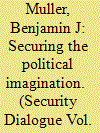|
|
|
Sort Order |
|
|
|
Items / Page
|
|
|
|
|
|
|
| Srl | Item |
| 1 |
ID:
124779


|
|
|
|
|
| Publication |
2013.
|
| Summary/Abstract |
The UN Special Tribunal for Lebanon (STL), which was set up through UN Security Council Resolution 1757 to investigate, indict and prosecute those responsible for the 2005 assassination of former Lebanese prime minister Rafik al-Hariri, is advancing a series of regional and global geopolitical interests. We focus on the structure of the tribunal and its exceptional nature within international law, examining the extent to which the STL's so-called unique features and the process through which it emerged expose its role in representing the interests of regional and global geopolitical actors, effectively internationalizing both the prosecution of the assassination and the issue of Hezbollah's disarmament within the discourse of the 'war on terror'. We also take up the question of Lebanese sovereignty and the extent to which the STL shifts between challenging and altogether disregarding this issue in a manner not unusual in the context of historical trends within international law justifying the colonial tendencies of great powers. We contextualize the STL within broader trajectories in international law, with specific reference to Carl Schmitt's 'challenge of imperial conquest and land acquisition', such as exceptionalism and the colonial genealogy of international law. We then discuss the extent to which the STL enunciates the geopolitical interests of powerful regional and global actors, unpacking the so-called unique features of the STL that reflect its exceptional character. Throughout our analysis, we argue that the STL and its manifestation of contemporary discourses of insecurity play a highly significant role in the international disregard for Lebanese sovereignty and the delegitimization of most domestic political actors, including Hezbollah.
|
|
|
|
|
|
|
|
|
|
|
|
|
|
|
|
| 2 |
ID:
103729


|
|
|
|
|
| Publication |
2011.
|
| Summary/Abstract |
This article considers the emerging security dispositif, particularly in terms of the growing reliance on risk, risk management, and technologies of risk in relation to contemporary border security. With the ongoing application of biometrics in the contemporary mobility regime in mind, the article argues that the use of these technologies, in combination with the widespread reliance on risk management, contributes to the re-imagination of borders and the bodies that cross them. The contention that the securitisation of mobility and bodies that results from this emerging logic of rule and the accompanying commitments to specific identification technologies (biometrics), also relies on a nuanced and complex reading of securitisation well beyond the caricatured accounts of the Copenhagen School.
|
|
|
|
|
|
|
|
|
|
|
|
|
|
|
|
| 3 |
ID:
081453


|
|
|
|
|
| Publication |
2008.
|
| Summary/Abstract |
What is the relationship between popular culture and the reliance on risk management as a framework for governance in the emerging security dispositif? Furthermore, how is one to understand the influence of culture and cultural forces in relation to the emerging biometric state and the alleged security imperatives therein? This article contends that the emerging security dispositif, and the associated imaginations and cultural performances that sustain and shape it, are vital to the production of what is referred to here as the `biometric state'. Motivated by an obsession with technologies of risk and practices of risk management, the biometric state is defined by the prevalence of virtual borders and reliance on biometric identifiers such as passports, trusted-traveller programmes and national ID cards, as well as the forms of social sorting that accompany these manoeuvres. Raising the marriage of convenience that connects two related dispositifs of security - geopolitics and biopolitics - the article considers the relationship between their referent objects: the state and everyday life, respectively. More specifically, popular culture integral to sustaining the emerging security dispositif forms the core of the analysis, as the article asserts the constitutive possibilities of popular culture
|
|
|
|
|
|
|
|
|
|
|
|
|
|
|
|
| 4 |
ID:
103134


|
|
|
|
|
| Publication |
London, Routledge, 2010.
|
| Description |
ix, 150p.Hbk
|
| Standard Number |
9780415484404
|
|
|
|
|
|
|
|
|
|
|
|
Copies: C:1/I:0,R:0,Q:0
Circulation
| Accession# | Call# | Current Location | Status | Policy | Location |
| 055847 | 929.9/MUL 055847 | Main | On Shelf | General | |
|
|
|
|
| 5 |
ID:
105351


|
|
|
|
|
| Publication |
2011.
|
| Summary/Abstract |
The proliferation and development of media during the current war in Iraq and the opening of the Iraqi media landscape, which had heretofore been dampened through authoritarian state control and international isolation due to economic sanctions, has played a role in political articulation and identity formation throughout the occupation in a fashion not seen during previous conflicts. The adoption of media tools, emerging as both technology and its applications - often referred to as Web 2.0 - impacted both combatants and civilians caught within the conflict providing them the opportunity to capture and articulate their own experience in a fashion never before available. This investigation points to the potential impacts on current political action, the resourcefulness of opposition access to media, as well as dangers posed through the emotive content most often produced. We argue that while such media production is disassociated from surrounding events (or decontextualised), its nonetheless trusted and impactful due to its viral distribution and sourcing networks and diverse in its impact on those not intimately involved due to its lack of overarching narrative and production away from sites of power.
|
|
|
|
|
|
|
|
|
|
|
|
|
|
|
|
|
|
|
|
|